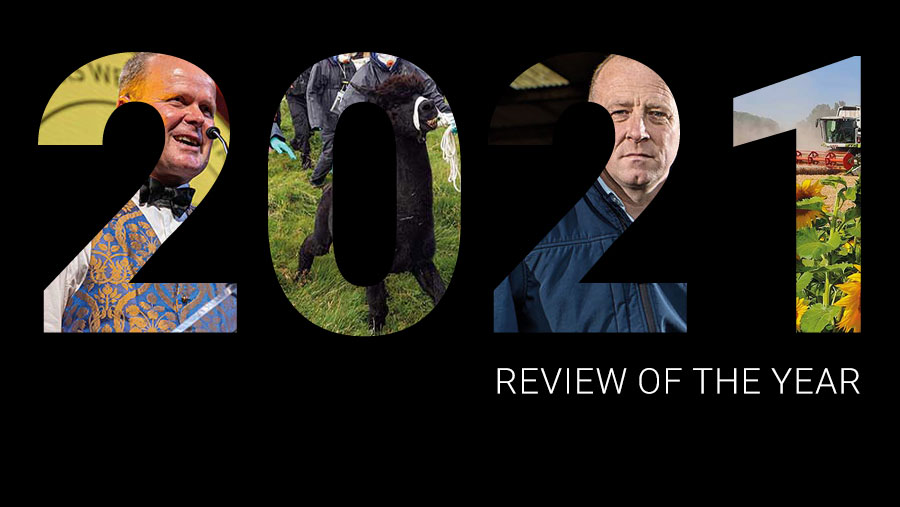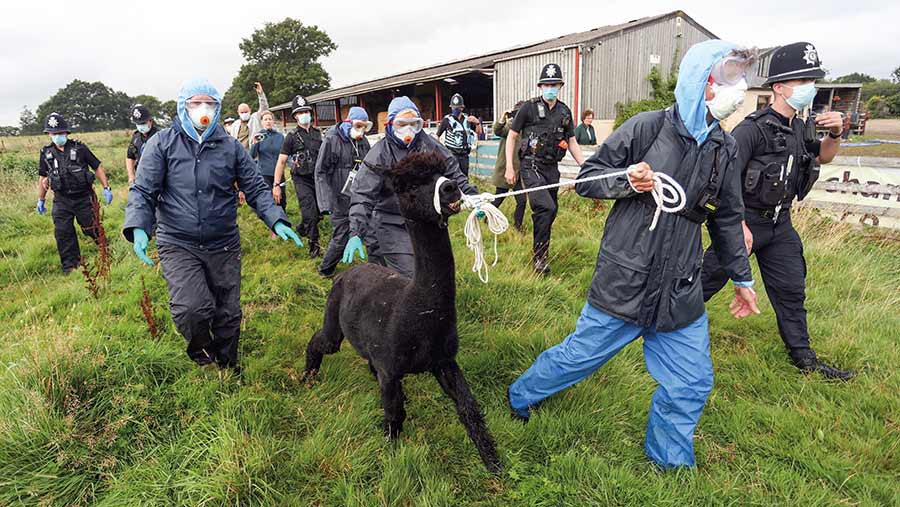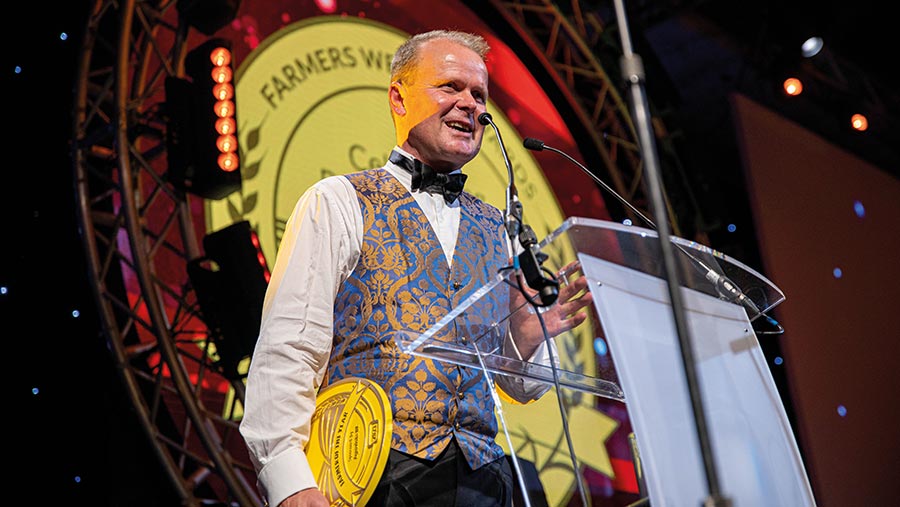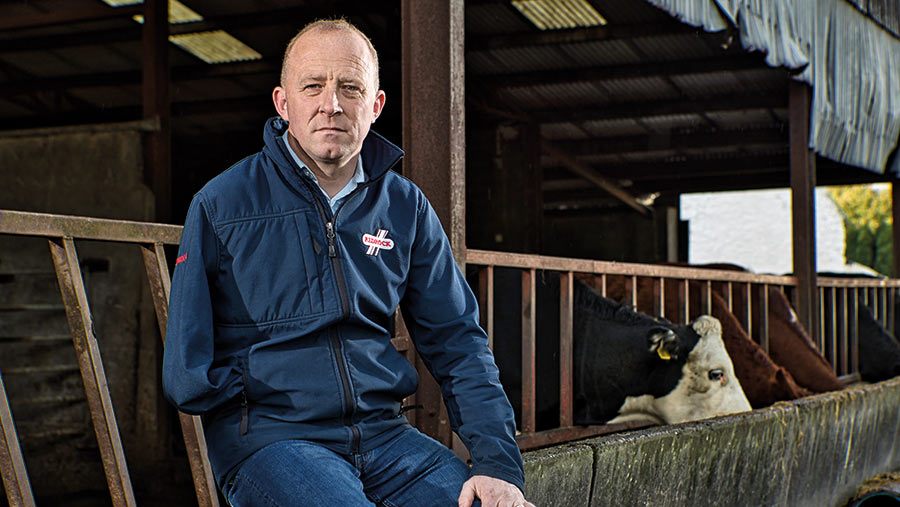2021: What made the farming news in September and October?

Our review of 2021 continues with a look at September and October.
An alpaca named Geronimo made the headlines; was it TB or not TB?
Meanwhile, the Farmers Weekly Awards finally returned to the Grosvenor Hotel in London, as it was revealed that thousands of healthy pigs were to be culled due to a chronic worker shortage.
See also: Video: Britain’s Fittest Farmer 2021 – the final
September
An alpaca at the centre of a bovine TB legal row was removed from its farm and humanely euthanised by government officials. Defra said the action was necessary to control the spread of the disease.
Geronimo the alpaca twice-tested positive for TB, but devastated owner Helen Macdonald insisted they were false positives.

© SWNS
Badger culling would be extended to seven new areas of England in the autumn as part of efforts to reduce outbreaks of bovine TB, Defra announced. Natural England issued culling licences in Hampshire, Berkshire and Worcestershire for the first time.
Intensive culling looks set to continue in existing areas of England until at least 2025, when a shift towards cattle vaccination is anticipated.
Growers called for a level playing field amid allegations of “double standards” over domestic and imported grain entering UK feed mills.
Currently, growers cannot sell their grain into these mills unless they are Red Tractor-assured, or equivalent. But grain imports are accepted if a form is ticked declaring the crop is grown using only pesticides approved in the UK.
A global glyphosate shortage triggered warnings for farmers to review their autumn requirements of the widely used herbicide.
Supply struggled to keep up with demand for several reasons, including less production by China, raw material shortages and Covid-related delays.
Norfolk farmer James Tallowin won Farmers Weekly’s Harvest Photography Competition.
He used a DSLR camera to capture an image of Costello winter wheat being combined on the last day of harvest, with a Countryside Stewardship conservation strip in the foreground.
TV presenter-turned-farmer Jeremy Clarkson added his support to the NFU’s Back British Farming Day.
Mr Clarkson joined NFU president Minette Batters on stage for an invite-only Q&A session in London, saying the UK’s self-sufficiency in food should be more like 80%, rather than the current rate of 60%.
The US agreed to lift a decades-old ban on imports of British lamb. The ban had been in place since about 2000, following outbreaks of bovine spongiform encephalopathy (BSE), also known as “mad cow disease”.
October
Defra secretary George Eustice announced that regulations controlling gene editing in agricultural research would be eased in England following a public consultation.
Field trials of gene-edited plants and animals could lead to commercial production and the technology could help tackle food security, climate change and biodiversity loss, said the minister.
Agrespect’s tractor dubbed “Sassy Ferguson” stole the limelight at the Birmingham Pride event.
Farmers marched alongside the rainbow-coloured MF 8S tractor to celebrate diversity and inclusion in rural areas. Agrespect supports rural diversity and wants to help LGBTQ+ people be open about their sexuality.
Suffolk arable farmer Edward Vipond was crowned 2021 Farmers Weekly Farmer of the Year at a glitzy awards ceremony to celebrate farming at the Grosvenor Hotel in London.

© Telling Photography
Separately, Cumbria-based Erica Robison and Somerset’s James Arney saw off stiff competition to lift FW’s Britain’s Fittest Farmer title.
A mass welfare cull of thousands of healthy pigs started place on farms due to a chronic worker shortage.
By mid-month, an estimated 6,000 healthy pigs had been culled and their bodies sent for disposal. The National Pig Association accused the government of ignoring its concerns for four months.
A major survey revealed how mounting pressures were having a major impact on the mental health of the farming community. More than 15,000 responses were gathered for the Royal Agricultural Benevolent Institution’s Big Farming Survey.
It revealed 36% were “probably or possibly depressed”, but despite the difficulties, 59% felt their businesses would be sustainable over the next five years.
Livestock farmers must focus on making their production more efficient to reduce greenhouse gas emissions in England, rather than reducing stock numbers, government policy stated.
The Net-Zero Strategy said “improved and innovative farming practices” must be the main way to reduce agriculture’s carbon emissions.

© Richard Stanton
Farmers Weekly launched its Dying to Feed You campaign, in partnership with Safety Revolution, which aims to encourage safer farm working practices.
The year-long initiative will also highlight to consumers the risks taken by farmers to put food on plates.
